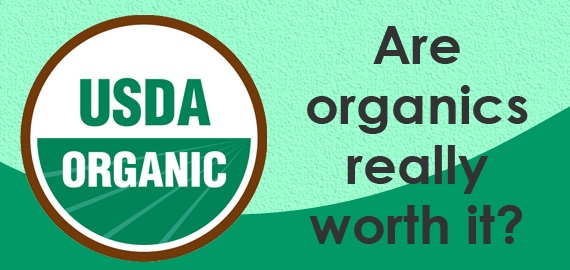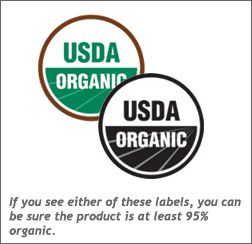By Tracie Swearingen, RD, CSO, LD – Minnesota Oncology
 “Should I choose organic foods?” is a frequent question asked among many patients and those concerned about cancer prevention or recurrence. A common complaint shortly thereafter, is “they are so expensive.” Most cancer patients want to do anything that may help their survival and prevent cancer recurrence, but is buying organic going to improve one’s health?
“Should I choose organic foods?” is a frequent question asked among many patients and those concerned about cancer prevention or recurrence. A common complaint shortly thereafter, is “they are so expensive.” Most cancer patients want to do anything that may help their survival and prevent cancer recurrence, but is buying organic going to improve one’s health?
What are organic foods and what does it mean to the consumer? Food can be labeled organic if it has been produced through approved methods. Approved methods are those that grow the food without use of prohibited pesticides, synthetic fertilizers, sewage sludge, genetically modified organisms, or ionizing radiation. Animals that produce meat, eggs and dairy products also do not take antibiotics or growth hormones. They also use 100% organic feed, and the animals have access to the outdoors. Organic food is produced by farmers who emphasize the use of renewable resources and the conservation of soil and water to enhance environmental quality for future generations.[1] There are various labeling terms to note that a food is organic.[2]
- 100% organic: Made with 100% organic ingredients
- Organic: Made with at least 95% organic ingredients
- Made with organic ingredients: A minimum of 70% organic ingredients with restrictions that the remaining 30% does not include GMO’s (genetically modified organisms)
- Products with <70% organic ingredients may list organic ingredients on the side panel of the package, but cannot make organic claims on the front.
 The Organic Seal – The product is certified organic and has 95% or more organic content. Just because a food is labeled “Natural” or “All Natural”, does not mean it is organic. So, is it necessary to eat organic to prevent cancer? According to the report, “Food, Nutrition, Physical Activity, and the Prevention of Cancer: A Global Perspective,” there is no epidemiological evidence that current exposures are causes of cancers in humans.[3] Although vegetables and fruit do sometimes contain low levels of pesticides and herbicides, overwhelming evidence supports the overall health benefits and cancer-protective effects of eating a wide variety vegetables and fruit. At present, there is no evidence that the low doses found in foods increase the risk of cancer, but fruits and vegetables should be washed thoroughly before eating.[4] If you are concerned about pesticides, changing to organic produce is perfectly fine, as long as the increased cost will not cause you to cut back on your fruits and vegetables. Another common concern is whether organic food is more nutritious. It appears the answer isn't clear yet. According to the Mayo Clinic, a recent study examined the past 50 years' worth of scientific articles about the nutrient content of organic and conventional foods. Researchers have concluded that organically and conventionally produced food items are not significantly different in their nutrient content.[5] If you’re still concerned about the safety of your food, follow these tips:
The Organic Seal – The product is certified organic and has 95% or more organic content. Just because a food is labeled “Natural” or “All Natural”, does not mean it is organic. So, is it necessary to eat organic to prevent cancer? According to the report, “Food, Nutrition, Physical Activity, and the Prevention of Cancer: A Global Perspective,” there is no epidemiological evidence that current exposures are causes of cancers in humans.[3] Although vegetables and fruit do sometimes contain low levels of pesticides and herbicides, overwhelming evidence supports the overall health benefits and cancer-protective effects of eating a wide variety vegetables and fruit. At present, there is no evidence that the low doses found in foods increase the risk of cancer, but fruits and vegetables should be washed thoroughly before eating.[4] If you are concerned about pesticides, changing to organic produce is perfectly fine, as long as the increased cost will not cause you to cut back on your fruits and vegetables. Another common concern is whether organic food is more nutritious. It appears the answer isn't clear yet. According to the Mayo Clinic, a recent study examined the past 50 years' worth of scientific articles about the nutrient content of organic and conventional foods. Researchers have concluded that organically and conventionally produced food items are not significantly different in their nutrient content.[5] If you’re still concerned about the safety of your food, follow these tips:
- Wash your fruit and vegetables with water to help remove dirt, bacteria and any traces of chemicals from the surface. You can also peel fruit and vegetables, but you might lose some fiber and nutrients.
- The Environmental Working Group has put together a practical approach to buying organic. If you are trying to avoid pesticides in your food, purchase produce listed in the “Dirty Dozen Plus” list in the organic form. The “Clean 15” list of produce contains the lowest in pesticide residues.[6]
Dirty Dozen Plus – Apples, strawberries, grapes, celery, spinach, sweet bell peppers, imported nectarines, cucumbers, cherry tomatoes, imported snap peas, potatoes, hot peppers and kale/collard greens
Clean 15 – Avocados, sweet corn, pineapple, cabbage, frozen sweet peas, onions, asparagus, mangoes, papayas, kiwi, eggplant, grapefruit, cantaloupe, cauliflower and sweet potatoes.
Buy your produce local at a farmer’s market or direct from a farmer. The produce tends to be higher in nutrients since they are fresher than those found in your grocery store. You can always ask how their produce is grown.
- http://www.ams.usda.gov National Organic Program. Accessed June 4, 2014
- http://www.organic.org/education/faqs Accessed June 4, 2014
- www.dietandcancerreport.org Accessed June 4, 2014
- http://www.cancer.org/healthy/eathealthygetactive/acsguidelinesonnutritionphysicalactivityforcancerprevention/index Accessed June 24, 2014
- http://www.mayoclinic.org/healthy-living/nutrition-and-healthy-eating/in-depth/organic-food/art-20043880?pg=2 Accessed June 24, 2014
- http://www.ewg.org/foodnews/ Accessed June 24, 2014



